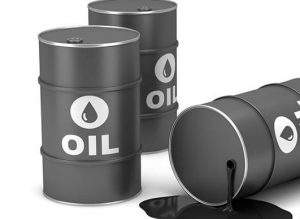Oil Prices Drop to $64.80 as Trade War Fuels Recession Fears

Samuel Mobolaji
Crude oil prices dropped to their lowest levels since April 2021 on Monday, falling about 1 per cent amid mounting concerns that escalating U.S. trade tensions could trigger a global recession and cripple energy demand.
The latest market plunge was sparked by President Donald Trump’s sweeping tariff threats, which rattled investors and fuelled fears of a full-blown global trade war. Brent crude fell 79 cents, or 1.2 per cent, to $64.80 per barrel, while U.S. West Texas Intermediate (WTI) lost 75 cents to $61.24—a retreat that pushed both benchmarks to near four-year lows.
Monday’s session was marked by sharp volatility, with prices swinging more than $3 per barrel overnight before briefly rebounding on reports—later dismissed by the White House as “fake news”—that the U.S. was considering a 90-day global tariff pause excluding China.
Markets remain wary after Trump doubled down on his protectionist stance, warning that foreign governments would need to pay “a lot of money” to see levies rolled back. In response, China announced retaliatory tariffs of 34 per cent on U.S. goods, reinforcing fears that global trade is spiralling into a prolonged conflict.
European Union officials, however, expressed cautious optimism, with EU Trade Commissioner Maros Sefcovic suggesting both sides would eventually return to the negotiating table.
Read Also: Afreximbank Commits $3bn to Boost Refining, Slash $30bn fuel Import Bill
Major financial institutions reacted swiftly to the developments. Goldman Sachs cut its oil forecasts and raised its U.S. recession risk to 45 per cent over the next 12 months. JPMorgan went further, putting the probability of a global recession at 60 per cent. Both Citi and Morgan Stanley also revised their Brent outlooks downward.
Adding further weight to the bearish sentiment, Saudi Arabia slashed its official selling prices for Asian buyers, citing weakening demand expectations. The move marked the kingdom’s steepest price cut in four months. “It’s a demonstration of the belief that tariffs will hurt oil demand,” said Tamas Varga, an analyst at PVM. “Like many others, the Saudis expect supply-demand dynamics to deteriorate.”
Meanwhile, the OPEC+ alliance announced plans to increase production by 411,000 barrels per day in May—up from the previously agreed 135,000 bpd—despite warnings of oversupply. The group urged over-producers to submit compensation plans by April 15, underlining efforts to enforce compliance even as demand falters.
Although oil and gas imports remain exempt from the new tariffs, analysts warn that the broader economic fallout—including potential inflation spikes and weakened global growth—could continue to drag down crude prices in the near term.









